Applying Ethical Theories: Amin Sthapit Murder Case Analysis Report
VerifiedAdded on 2021/05/30
|6
|1598
|386
Report
AI Summary
This report analyzes a case study involving a murder, applying ethical theories to understand the actions and motivations of the accused. The report begins with an introduction to the ethical frameworks of utilitarianism, deontology, virtue theory, and contract theory. The core of the report examines the case of Roy Tabalbag, accused of killing his girlfriend's lover, Amin Sthapit, focusing on how each ethical theory can be used to evaluate the morality of the actions. The report delves into how utilitarianism considers the pleasure and consequences of actions, deontology emphasizes moral duties and obligations, virtue theory focuses on the character and virtues of the individuals involved, and contract theory examines societal rules and rights. The conclusion emphasizes the importance of using different ethical theories for making judgments in complex situations. The report references the ethical theories and their application to the case, providing a comprehensive analysis of the ethical dimensions of the murder.
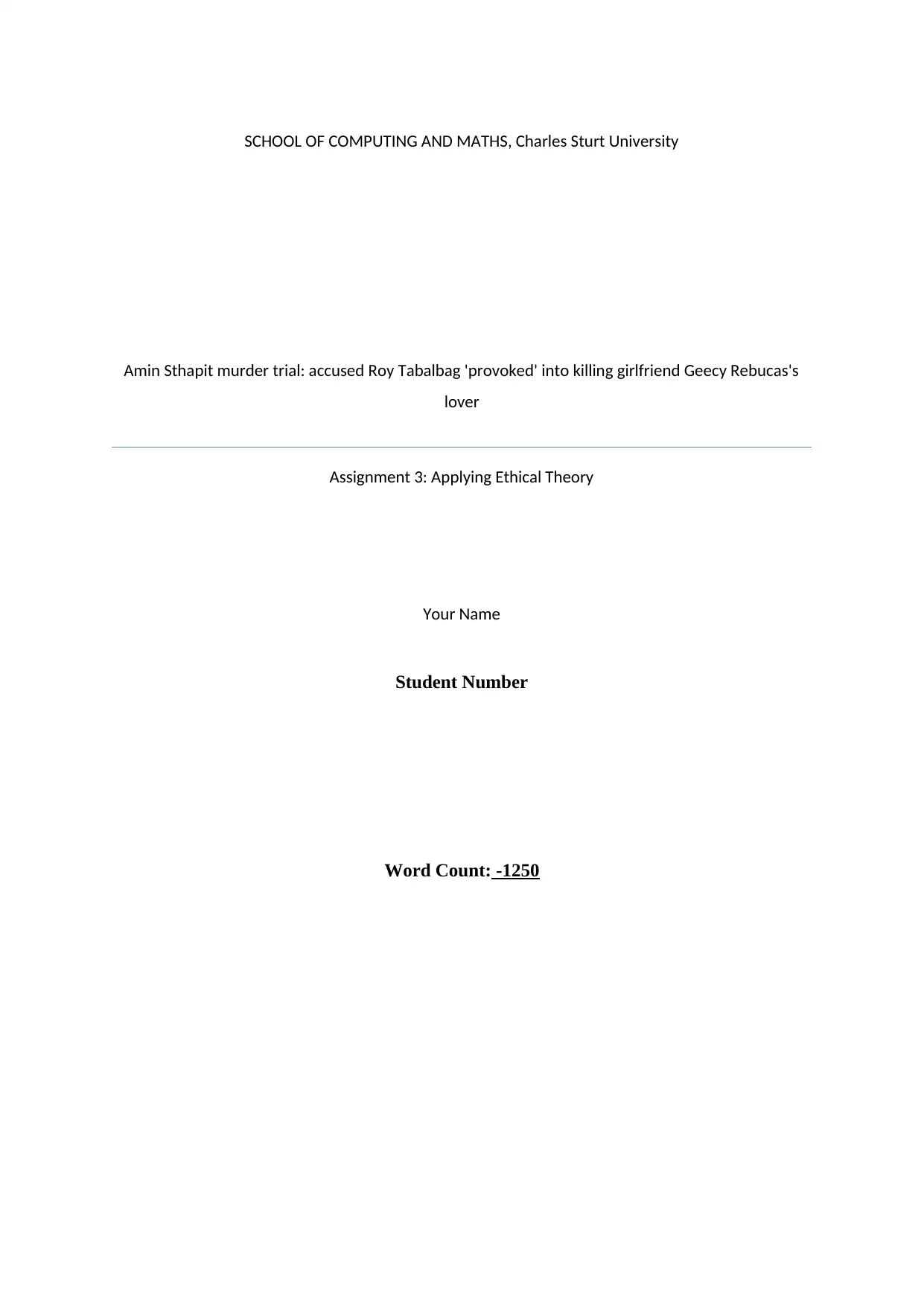
SCHOOL OF COMPUTING AND MATHS, Charles Sturt University
Amin Sthapit murder trial: accused Roy Tabalbag 'provoked' into killing girlfriend Geecy Rebucas's
lover
Assignment 3: Applying Ethical Theory
Your Name
Student Number
Word Count: -1250
Amin Sthapit murder trial: accused Roy Tabalbag 'provoked' into killing girlfriend Geecy Rebucas's
lover
Assignment 3: Applying Ethical Theory
Your Name
Student Number
Word Count: -1250
Paraphrase This Document
Need a fresh take? Get an instant paraphrase of this document with our AI Paraphraser
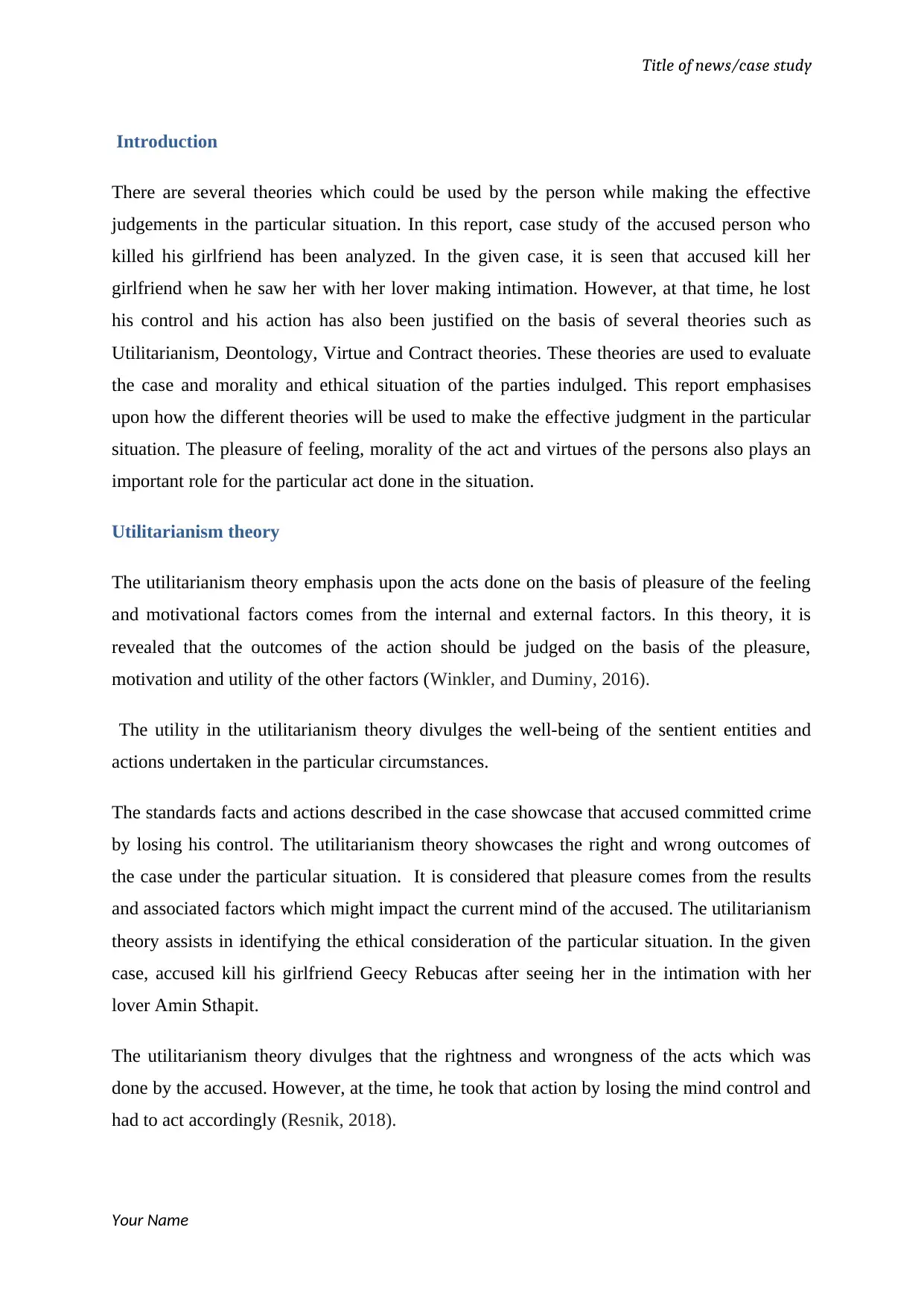
Title of news/case study
Introduction
There are several theories which could be used by the person while making the effective
judgements in the particular situation. In this report, case study of the accused person who
killed his girlfriend has been analyzed. In the given case, it is seen that accused kill her
girlfriend when he saw her with her lover making intimation. However, at that time, he lost
his control and his action has also been justified on the basis of several theories such as
Utilitarianism, Deontology, Virtue and Contract theories. These theories are used to evaluate
the case and morality and ethical situation of the parties indulged. This report emphasises
upon how the different theories will be used to make the effective judgment in the particular
situation. The pleasure of feeling, morality of the act and virtues of the persons also plays an
important role for the particular act done in the situation.
Utilitarianism theory
The utilitarianism theory emphasis upon the acts done on the basis of pleasure of the feeling
and motivational factors comes from the internal and external factors. In this theory, it is
revealed that the outcomes of the action should be judged on the basis of the pleasure,
motivation and utility of the other factors (Winkler, and Duminy, 2016).
The utility in the utilitarianism theory divulges the well-being of the sentient entities and
actions undertaken in the particular circumstances.
The standards facts and actions described in the case showcase that accused committed crime
by losing his control. The utilitarianism theory showcases the right and wrong outcomes of
the case under the particular situation. It is considered that pleasure comes from the results
and associated factors which might impact the current mind of the accused. The utilitarianism
theory assists in identifying the ethical consideration of the particular situation. In the given
case, accused kill his girlfriend Geecy Rebucas after seeing her in the intimation with her
lover Amin Sthapit.
The utilitarianism theory divulges that the rightness and wrongness of the acts which was
done by the accused. However, at the time, he took that action by losing the mind control and
had to act accordingly (Resnik, 2018).
Your Name
Introduction
There are several theories which could be used by the person while making the effective
judgements in the particular situation. In this report, case study of the accused person who
killed his girlfriend has been analyzed. In the given case, it is seen that accused kill her
girlfriend when he saw her with her lover making intimation. However, at that time, he lost
his control and his action has also been justified on the basis of several theories such as
Utilitarianism, Deontology, Virtue and Contract theories. These theories are used to evaluate
the case and morality and ethical situation of the parties indulged. This report emphasises
upon how the different theories will be used to make the effective judgment in the particular
situation. The pleasure of feeling, morality of the act and virtues of the persons also plays an
important role for the particular act done in the situation.
Utilitarianism theory
The utilitarianism theory emphasis upon the acts done on the basis of pleasure of the feeling
and motivational factors comes from the internal and external factors. In this theory, it is
revealed that the outcomes of the action should be judged on the basis of the pleasure,
motivation and utility of the other factors (Winkler, and Duminy, 2016).
The utility in the utilitarianism theory divulges the well-being of the sentient entities and
actions undertaken in the particular circumstances.
The standards facts and actions described in the case showcase that accused committed crime
by losing his control. The utilitarianism theory showcases the right and wrong outcomes of
the case under the particular situation. It is considered that pleasure comes from the results
and associated factors which might impact the current mind of the accused. The utilitarianism
theory assists in identifying the ethical consideration of the particular situation. In the given
case, accused kill his girlfriend Geecy Rebucas after seeing her in the intimation with her
lover Amin Sthapit.
The utilitarianism theory divulges that the rightness and wrongness of the acts which was
done by the accused. However, at the time, he took that action by losing the mind control and
had to act accordingly (Resnik, 2018).
Your Name
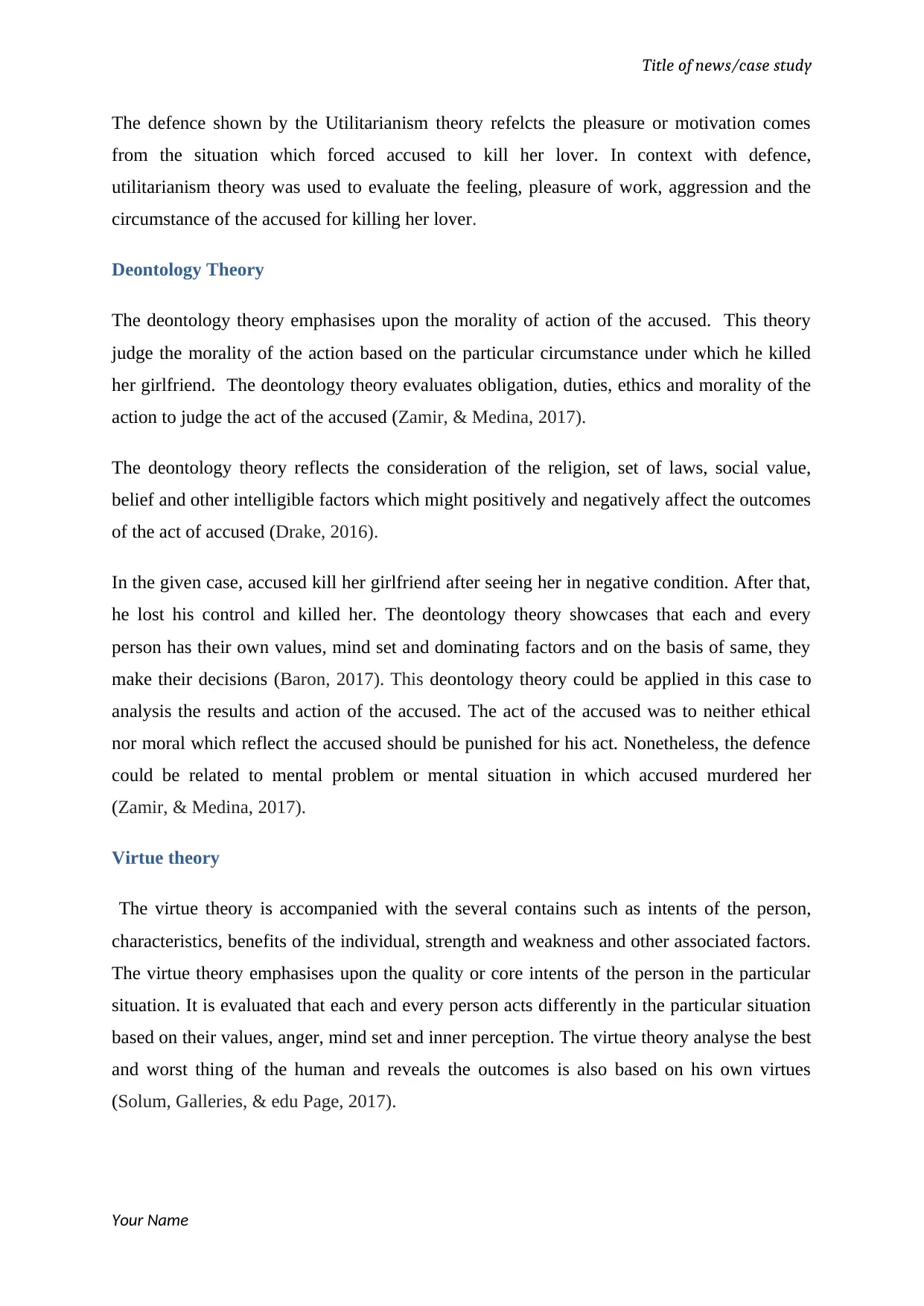
Title of news/case study
The defence shown by the Utilitarianism theory refelcts the pleasure or motivation comes
from the situation which forced accused to kill her lover. In context with defence,
utilitarianism theory was used to evaluate the feeling, pleasure of work, aggression and the
circumstance of the accused for killing her lover.
Deontology Theory
The deontology theory emphasises upon the morality of action of the accused. This theory
judge the morality of the action based on the particular circumstance under which he killed
her girlfriend. The deontology theory evaluates obligation, duties, ethics and morality of the
action to judge the act of the accused (Zamir, & Medina, 2017).
The deontology theory reflects the consideration of the religion, set of laws, social value,
belief and other intelligible factors which might positively and negatively affect the outcomes
of the act of accused (Drake, 2016).
In the given case, accused kill her girlfriend after seeing her in negative condition. After that,
he lost his control and killed her. The deontology theory showcases that each and every
person has their own values, mind set and dominating factors and on the basis of same, they
make their decisions (Baron, 2017). This deontology theory could be applied in this case to
analysis the results and action of the accused. The act of the accused was to neither ethical
nor moral which reflect the accused should be punished for his act. Nonetheless, the defence
could be related to mental problem or mental situation in which accused murdered her
(Zamir, & Medina, 2017).
Virtue theory
The virtue theory is accompanied with the several contains such as intents of the person,
characteristics, benefits of the individual, strength and weakness and other associated factors.
The virtue theory emphasises upon the quality or core intents of the person in the particular
situation. It is evaluated that each and every person acts differently in the particular situation
based on their values, anger, mind set and inner perception. The virtue theory analyse the best
and worst thing of the human and reveals the outcomes is also based on his own virtues
(Solum, Galleries, & edu Page, 2017).
Your Name
The defence shown by the Utilitarianism theory refelcts the pleasure or motivation comes
from the situation which forced accused to kill her lover. In context with defence,
utilitarianism theory was used to evaluate the feeling, pleasure of work, aggression and the
circumstance of the accused for killing her lover.
Deontology Theory
The deontology theory emphasises upon the morality of action of the accused. This theory
judge the morality of the action based on the particular circumstance under which he killed
her girlfriend. The deontology theory evaluates obligation, duties, ethics and morality of the
action to judge the act of the accused (Zamir, & Medina, 2017).
The deontology theory reflects the consideration of the religion, set of laws, social value,
belief and other intelligible factors which might positively and negatively affect the outcomes
of the act of accused (Drake, 2016).
In the given case, accused kill her girlfriend after seeing her in negative condition. After that,
he lost his control and killed her. The deontology theory showcases that each and every
person has their own values, mind set and dominating factors and on the basis of same, they
make their decisions (Baron, 2017). This deontology theory could be applied in this case to
analysis the results and action of the accused. The act of the accused was to neither ethical
nor moral which reflect the accused should be punished for his act. Nonetheless, the defence
could be related to mental problem or mental situation in which accused murdered her
(Zamir, & Medina, 2017).
Virtue theory
The virtue theory is accompanied with the several contains such as intents of the person,
characteristics, benefits of the individual, strength and weakness and other associated factors.
The virtue theory emphasises upon the quality or core intents of the person in the particular
situation. It is evaluated that each and every person acts differently in the particular situation
based on their values, anger, mind set and inner perception. The virtue theory analyse the best
and worst thing of the human and reveals the outcomes is also based on his own virtues
(Solum, Galleries, & edu Page, 2017).
Your Name
⊘ This is a preview!⊘
Do you want full access?
Subscribe today to unlock all pages.

Trusted by 1+ million students worldwide
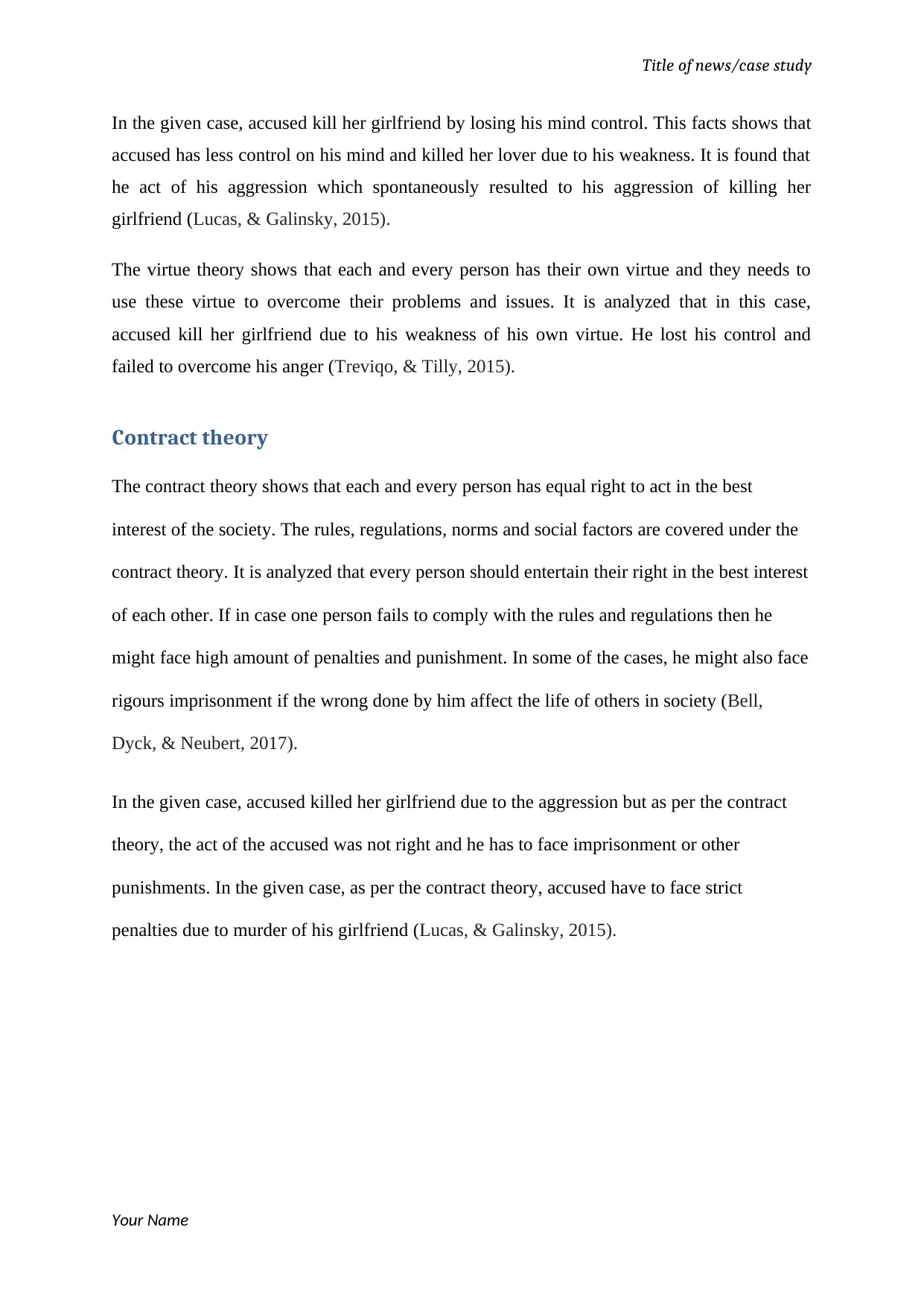
Title of news/case study
In the given case, accused kill her girlfriend by losing his mind control. This facts shows that
accused has less control on his mind and killed her lover due to his weakness. It is found that
he act of his aggression which spontaneously resulted to his aggression of killing her
girlfriend (Lucas, & Galinsky, 2015).
The virtue theory shows that each and every person has their own virtue and they needs to
use these virtue to overcome their problems and issues. It is analyzed that in this case,
accused kill her girlfriend due to his weakness of his own virtue. He lost his control and
failed to overcome his anger (Treviqo, & Tilly, 2015).
Contract theory
The contract theory shows that each and every person has equal right to act in the best
interest of the society. The rules, regulations, norms and social factors are covered under the
contract theory. It is analyzed that every person should entertain their right in the best interest
of each other. If in case one person fails to comply with the rules and regulations then he
might face high amount of penalties and punishment. In some of the cases, he might also face
rigours imprisonment if the wrong done by him affect the life of others in society (Bell,
Dyck, & Neubert, 2017).
In the given case, accused killed her girlfriend due to the aggression but as per the contract
theory, the act of the accused was not right and he has to face imprisonment or other
punishments. In the given case, as per the contract theory, accused have to face strict
penalties due to murder of his girlfriend (Lucas, & Galinsky, 2015).
Your Name
In the given case, accused kill her girlfriend by losing his mind control. This facts shows that
accused has less control on his mind and killed her lover due to his weakness. It is found that
he act of his aggression which spontaneously resulted to his aggression of killing her
girlfriend (Lucas, & Galinsky, 2015).
The virtue theory shows that each and every person has their own virtue and they needs to
use these virtue to overcome their problems and issues. It is analyzed that in this case,
accused kill her girlfriend due to his weakness of his own virtue. He lost his control and
failed to overcome his anger (Treviqo, & Tilly, 2015).
Contract theory
The contract theory shows that each and every person has equal right to act in the best
interest of the society. The rules, regulations, norms and social factors are covered under the
contract theory. It is analyzed that every person should entertain their right in the best interest
of each other. If in case one person fails to comply with the rules and regulations then he
might face high amount of penalties and punishment. In some of the cases, he might also face
rigours imprisonment if the wrong done by him affect the life of others in society (Bell,
Dyck, & Neubert, 2017).
In the given case, accused killed her girlfriend due to the aggression but as per the contract
theory, the act of the accused was not right and he has to face imprisonment or other
punishments. In the given case, as per the contract theory, accused have to face strict
penalties due to murder of his girlfriend (Lucas, & Galinsky, 2015).
Your Name
Paraphrase This Document
Need a fresh take? Get an instant paraphrase of this document with our AI Paraphraser
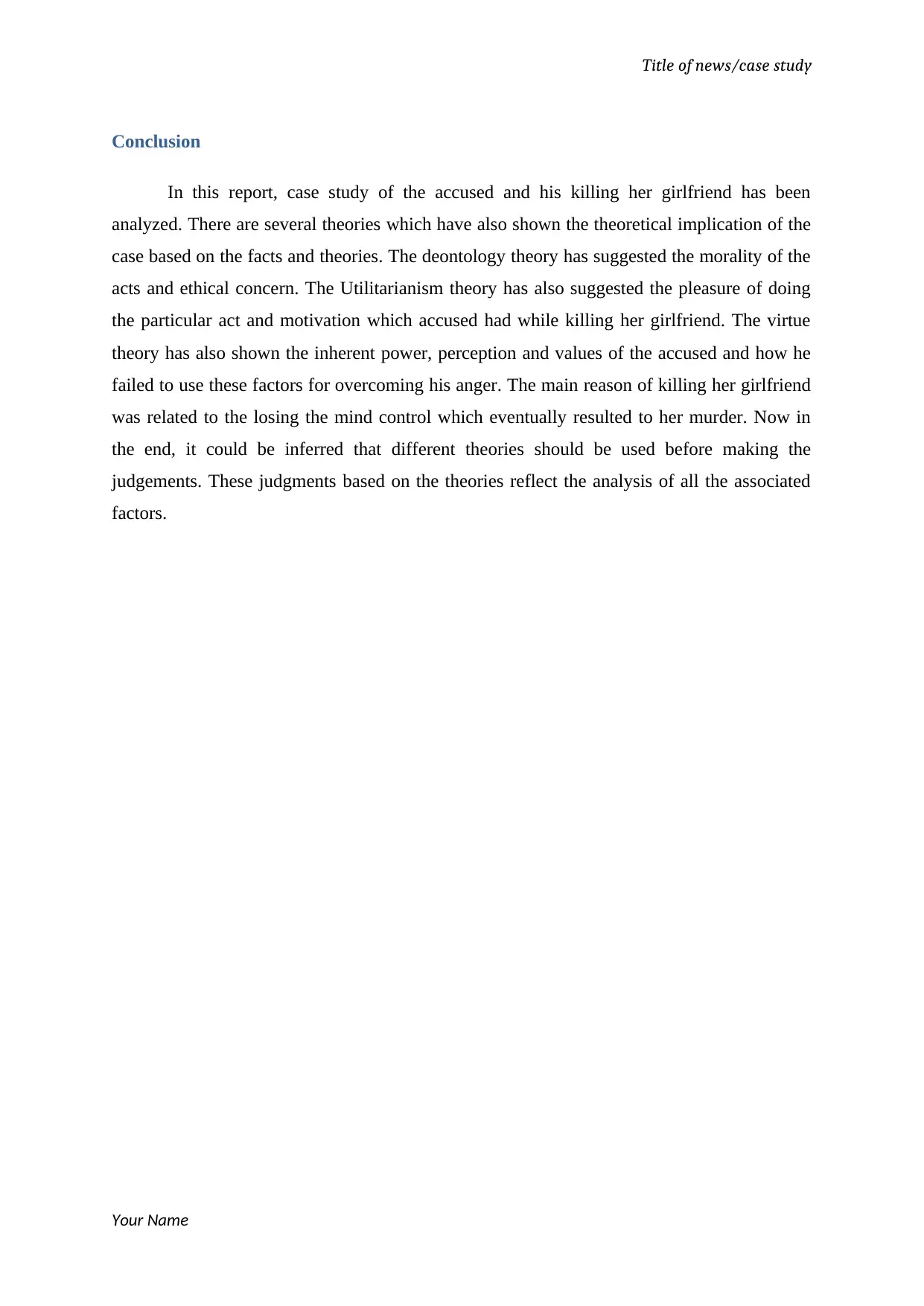
Title of news/case study
Conclusion
In this report, case study of the accused and his killing her girlfriend has been
analyzed. There are several theories which have also shown the theoretical implication of the
case based on the facts and theories. The deontology theory has suggested the morality of the
acts and ethical concern. The Utilitarianism theory has also suggested the pleasure of doing
the particular act and motivation which accused had while killing her girlfriend. The virtue
theory has also shown the inherent power, perception and values of the accused and how he
failed to use these factors for overcoming his anger. The main reason of killing her girlfriend
was related to the losing the mind control which eventually resulted to her murder. Now in
the end, it could be inferred that different theories should be used before making the
judgements. These judgments based on the theories reflect the analysis of all the associated
factors.
Your Name
Conclusion
In this report, case study of the accused and his killing her girlfriend has been
analyzed. There are several theories which have also shown the theoretical implication of the
case based on the facts and theories. The deontology theory has suggested the morality of the
acts and ethical concern. The Utilitarianism theory has also suggested the pleasure of doing
the particular act and motivation which accused had while killing her girlfriend. The virtue
theory has also shown the inherent power, perception and values of the accused and how he
failed to use these factors for overcoming his anger. The main reason of killing her girlfriend
was related to the losing the mind control which eventually resulted to her murder. Now in
the end, it could be inferred that different theories should be used before making the
judgements. These judgments based on the theories reflect the analysis of all the associated
factors.
Your Name
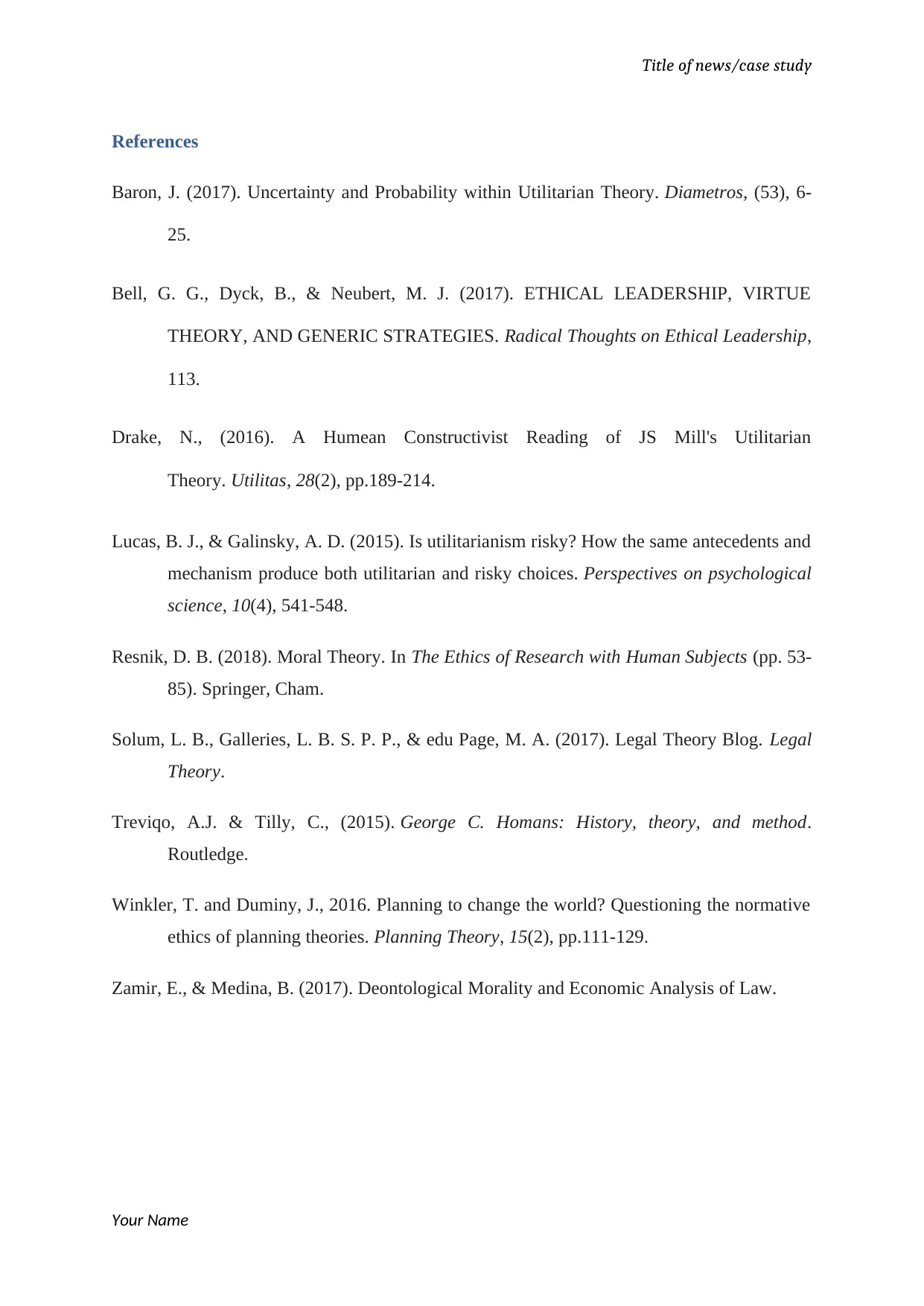
Title of news/case study
References
Baron, J. (2017). Uncertainty and Probability within Utilitarian Theory. Diametros, (53), 6-
25.
Bell, G. G., Dyck, B., & Neubert, M. J. (2017). ETHICAL LEADERSHIP, VIRTUE
THEORY, AND GENERIC STRATEGIES. Radical Thoughts on Ethical Leadership,
113.
Drake, N., (2016). A Humean Constructivist Reading of JS Mill's Utilitarian
Theory. Utilitas, 28(2), pp.189-214.
Lucas, B. J., & Galinsky, A. D. (2015). Is utilitarianism risky? How the same antecedents and
mechanism produce both utilitarian and risky choices. Perspectives on psychological
science, 10(4), 541-548.
Resnik, D. B. (2018). Moral Theory. In The Ethics of Research with Human Subjects (pp. 53-
85). Springer, Cham.
Solum, L. B., Galleries, L. B. S. P. P., & edu Page, M. A. (2017). Legal Theory Blog. Legal
Theory.
Treviqo, A.J. & Tilly, C., (2015). George C. Homans: History, theory, and method.
Routledge.
Winkler, T. and Duminy, J., 2016. Planning to change the world? Questioning the normative
ethics of planning theories. Planning Theory, 15(2), pp.111-129.
Zamir, E., & Medina, B. (2017). Deontological Morality and Economic Analysis of Law.
Your Name
References
Baron, J. (2017). Uncertainty and Probability within Utilitarian Theory. Diametros, (53), 6-
25.
Bell, G. G., Dyck, B., & Neubert, M. J. (2017). ETHICAL LEADERSHIP, VIRTUE
THEORY, AND GENERIC STRATEGIES. Radical Thoughts on Ethical Leadership,
113.
Drake, N., (2016). A Humean Constructivist Reading of JS Mill's Utilitarian
Theory. Utilitas, 28(2), pp.189-214.
Lucas, B. J., & Galinsky, A. D. (2015). Is utilitarianism risky? How the same antecedents and
mechanism produce both utilitarian and risky choices. Perspectives on psychological
science, 10(4), 541-548.
Resnik, D. B. (2018). Moral Theory. In The Ethics of Research with Human Subjects (pp. 53-
85). Springer, Cham.
Solum, L. B., Galleries, L. B. S. P. P., & edu Page, M. A. (2017). Legal Theory Blog. Legal
Theory.
Treviqo, A.J. & Tilly, C., (2015). George C. Homans: History, theory, and method.
Routledge.
Winkler, T. and Duminy, J., 2016. Planning to change the world? Questioning the normative
ethics of planning theories. Planning Theory, 15(2), pp.111-129.
Zamir, E., & Medina, B. (2017). Deontological Morality and Economic Analysis of Law.
Your Name
⊘ This is a preview!⊘
Do you want full access?
Subscribe today to unlock all pages.

Trusted by 1+ million students worldwide
1 out of 6
Related Documents
Your All-in-One AI-Powered Toolkit for Academic Success.
+13062052269
info@desklib.com
Available 24*7 on WhatsApp / Email
![[object Object]](/_next/static/media/star-bottom.7253800d.svg)
Unlock your academic potential
Copyright © 2020–2026 A2Z Services. All Rights Reserved. Developed and managed by ZUCOL.





